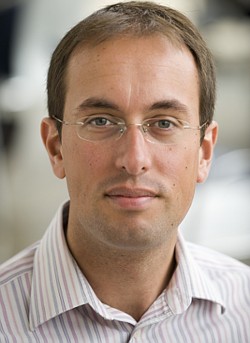Royal Society recognises Institute researcher

Dr Matthew Hurles, a Wellcome Trust Sanger Institute researcher, has been invited by the Royal Society to deliver the prestigious Francis Crick Lecture. Today’s announcement (Tuesday 10 July) recognises Dr Hurles’ significant contribution to the understanding of genetic variation in populations, specifically gains and losses of large segments of DNA and their clinical consequences.
The Francis Crick Lecture is given annually in any field in the biological sciences. Preference is given to the general areas in which Francis Crick worked – genetics, molecular biology and neurobiology – and also to fundamental theoretical work, which was the hallmark of Crick’s science.
“It is a great privilege to be given the opportunity to deliver the Francis Crick Lecture at the Royal Society and to follow in the footsteps of many eminent scientists. This honour would not have been possible without the tremendous efforts of my group and collaborators.”
Dr Matthew Hurles who leads the Genomic Mutation and Genetic Disease Group at the Sanger Institute
Dr Hurles received his PhD from the University of Leicester in 1999 for work on the population genetics of the different forms of the human Y chromosome. During his postdoctoral research at the University of Cambridge, Dr Hurles established the molecular mechanism underlying a recurrent deletion of part of the Y chromosome, which causes male infertility.
Dr Hurles now leads the Genomic Mutation and Genetic Disease Group at the Sanger Institute. Since 2003 he has led a major initiative to characterise structural variation in the human genome and integrate this knowledge into disease and population genetic studies.
He is involved in several large consortia such as the UK10K project and the 1000 Genomes project to sequence and compare 10,000 and 1,000 genomes respectively. Dr Hurles also joint leader of the Deciphering Developmental Disorders project, a study which aims to elucidate the genetic causes of undiagnosed severe developmental disorders in children and improve the design of future diagnostic assays.
“Matthew’s award recognises a highly talented and articulate young researcher whose compelling insights into genetic variation are yielding ever-improving understanding of inherited disease in adults and children.”
Professor Mike Stratton Director of the Wellcome Trust Sanger Institute
More information
Selected websites
The Royal Society
The Royal Society is a self-governing Fellowship of many of the world’s most distinguished scientists drawn from all areas of science, engineering, and medicine. The Society’s fundamental purpose, as it has been since its foundation in 1660, is to recognise, promote, and support excellence in science and to encourage the development and use of science for the benefit of humanity.
The Society’s strategic priorities emphasise its commitment to the highest quality science, to curiosity-driven research, and to the development and use of science for the benefit of society. These priorities are:
- Promoting science and its benefits
- Recognising excellence in science
- Supporting outstanding science
- Providing scientific advice for policy
- Fostering international and global cooperation
- Education and public engagement
Deciphering Developmental Disorders
The Deciphering Developmental Disorders (DDD) study aims to use new genomic technologies to improve the diagnosis of developmental disorders in children. It is a collaboration between the NHS clinical genetics services, the Wellcome Trust Sanger Institute and families across the UK.
The Wellcome Trust Sanger Institute
The Wellcome Trust Sanger Institute is one of the world’s leading genome centres. Through its ability to conduct research at scale, it is able to engage in bold and long-term exploratory projects that are designed to influence and empower medical science globally. Institute research findings, generated through its own research programmes and through its leading role in international consortia, are being used to develop new diagnostics and treatments for human disease.
The Wellcome Trust
The Wellcome Trust is a global charitable foundation dedicated to achieving extraordinary improvements in human and animal health. We support the brightest minds in biomedical research and the medical humanities. Our breadth of support includes public engagement, education and the application of research to improve health. We are independent of both political and commercial interests.


